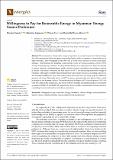Willingness to Pay for Renewable Energy in Myanmar: Energy Source Preference
Author(s)
Numata, Masako; Sugiyama, Masahiro; Swe, Wunna; del Barrio Alvarez, Daniel
Downloadenergies-14-01505-v2.pdf (3.316Mb)
Publisher with Creative Commons License
Publisher with Creative Commons License
Creative Commons Attribution
Terms of use
Metadata
Show full item recordAbstract
The increased use of renewable energy is imperative as a countermeasure to climate change. As with conventional electricity generation technologies, public acceptance of renewables is an important issue, and willingness to pay (WTP) is a widely used indicator to assess such public attitudes. Unfortunately, the literature to date mostly covers developed countries, with few WTP surveys in developing countries. Tackling climate change is an urgent issue for these developing countries; therefore, understanding of public attitudes toward renewables in developing countries is crucial. This study conducted the first survey on WTP for introducing renewable energy in Myanmar. Although Myanmar boasts abundant renewable energy resources, including solar power and biomass in addition to large-scale hydro plants, its resources are not being properly utilized to generate electricity. This study surveyed WTP for power generation by solar photovoltaics, small hydropower, and biomass facilities. The results showed the highest WTP for solar power (USD 1.92) with 10% share in the energy mix, and lower WTP for biomass and small hydropower electricity generations (USD 1.13 and USD 1.17, respectively). Careful public communication is thus crucial for expanding biomass and small-scale hydro power plants.
Date issued
2021-03-09Department
Massachusetts Institute of Technology. Joint Program on the Science & Policy of Global ChangePublisher
Multidisciplinary Digital Publishing Institute
Citation
Energies 14 (5): 1505 (2021)
Version: Final published version